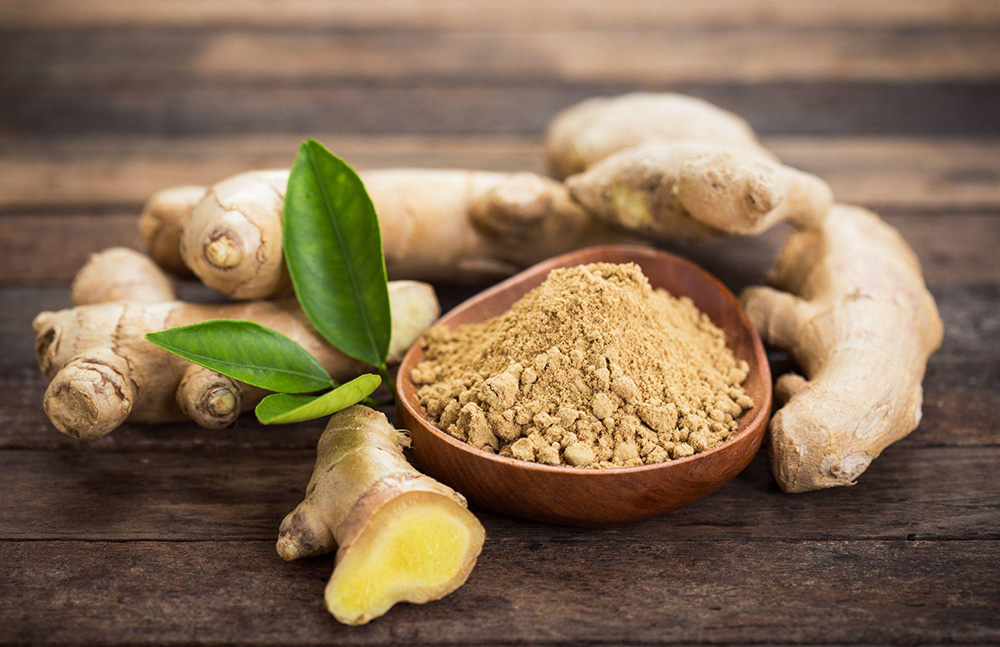
Spices are important ingredients in adding flavor to your favorite dishes. They can come from the seeds, roots, buds, bark, resin, or fruits of a plant. Spices are usually used in their dried form – with a few exceptions like ginger and chili peppers. They provide numerous health benefits and contain hefty doses of antioxidants, anti-inflammatory agents, minerals, and vitamins.
Ginger is a flowering plant and has been widely used as a food spice and for medicinal purposes. It is considered one of the healthiest and most delicious spices all over the world. Ginger can be used as dried powder, oil, juice, or fresh and it is among the most common agents for the preparation of spicy foods.
Ginger contains a large number of bioactive phenolic compounds such as gingerol, gingerenone, zingerone, and others. Its medicinal properties are largely attributed to the most active polyphenolic fraction which is gingerol. Ginger serves as a popular remedy for cough and asthma when the juice of fresh ginger is mixed with fresh garlic and honey.
One of the more popular ginger-based products is ginger tea. It is commonly used as traditional medicine for improving digestion and managing several disorders such as nausea and the common cold.
At the Hundred Wellness Centre, our healthy café serves goji and ginger tea for you to savour. Here are several health-boosting benefits of ginger and ginger-based products.
Treating nausea and morning sickness
One of its uses has always been the treatment of nausea. The aromatic, spasmolytic, and absorbent properties of ginger suggest that it has direct effects on the gastrointestinal tract.
Ginger may also relieve nausea and vomiting after surgery, and in cancer patients undergoing chemotherapy. In addition, it appears to be highly effective against morning sickness associated with pregnancy.
Although ginger is considered safe during pregnancy, consult your doctor before taking large amounts. Some believe that large amounts can increase the risk of miscarriage, but there are currently no studies to support this.
Reducing the risk of both bacterial and viral infections.
Microbial infections are the major cause of morbidity and mortality worldwide. Although a number of antibiotics are available now for the treatment of infectious diseases, antibiotic misuse leads to the development of antibiotic resistance which is a major health concern. Therefore, there is a perpetual need to exploit new bioactive principles with high safety index.
Historically, medicinal plants have been a source of novel drug compounds. Plant-derived products have made large contributions to human health and wellbeing.
Ginger was found to be highly effective against oral bacteria associated with gingivitis and periodontitis, a serious gum infection. Ginger is also effective against respiratory viral infection, but it is by no means of a medically proven treatment against coronavirus disease-19 according to the World Health Organization (WHO)
Reducing body weight and controlling blood sugar
Ginger has the potential to reduce body weight and now is also known as a weight-reducing agent. The intake of ginger not only reduces body weight but also reduces glucose levels and increases high-density lipoprotein (HDL) cholesterol levels (good cholesterol), as a result, it reduces the chance for the onset of heart diseases.
Improving the brain functions and declining the neural aging process
Numerous animal and cellular-based studies concluded that gingerol performs anti-inflammatory activities in the brain which protect age-associated decline of brain functions
Ginger can also play a protective role against certain cancers (including colorectal cancer, stomach cancer, and breast cancer).


